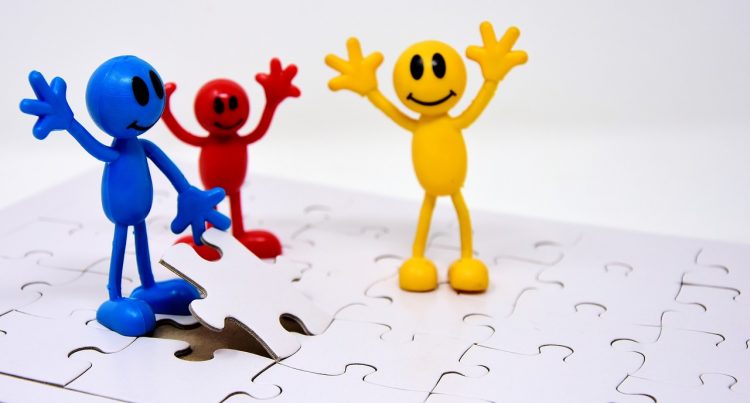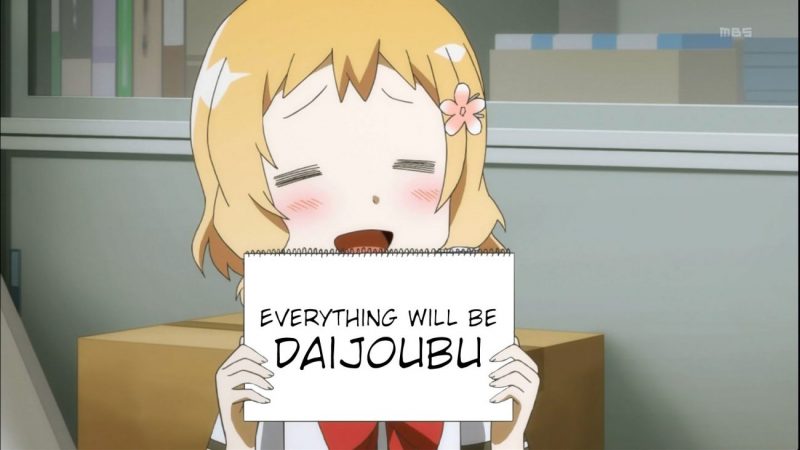One of the most popular words in the Japanese language that does not have a literal translation is daijoubu which is written using the kanji [大丈夫]. Its meaning is a bit ambiguous, so we will clear up the confusion that this word causes for Japanese learners.
The word daijobu is often translated as “don't worry or it's all right”, but in this article we will try to investigate deeper the true meaning and use of the word daijobu.
The word daijoubu can be an adjective, an adverb and a noun used in questions and answers and different situations in the Japanese language. This expression has also become popular in the West due to otaku and anime. It is often used as a response to people asking or asking if they can do something.

Table of Content
What is the meaning of Daijoubu?
As an adjective of the type [な], the word daijoubu [大丈夫] can mean that something is safe, free of problems, that one can perform the action without any fear, that everything is fine or okay.
When daijoubu is used as an adverb, it conveys the idea that everything is fine, no doubts or no problems.
The word daijōbu (another romanization) can also be used to reject some things equivalent to a "thank you" or another expression of gratitude.
She can convey the idea of "no thank you", "it's all right", "it's okay", "don't mind me". The most common interpretation of the word is a simple "I’m fine" especially if accompanied by "desu" [です] or "da" [だ].
When used as a question, we can translate it as “are you okay?” or “everything ok?”. If someone stumbles, looks sad, got scared, or has done anything that involves a concern, the term “daijoubu” is perhaps the most polite expression to use.
The meaning of the word will depend on the context used!

What is the origin of Daijoubu?
Formerly the word referred to a big tall man, hence the characters 大 (big), 丈 (tall) and 夫 (husband). What do these ideograms have to do with the meaning of the word?
In the old days in China, calling young people “strong and resilient men” was a kind of compliment about how they are growing and becoming healthy.
At the time such a term was used for both sexes to refer to their health and well-being.
Studying these ideograms in depth, their meaning makes perfect sense. “Dai” [大] means big, strong and very. The rest of the word “joubu” [丈夫] means healthy, robust, strong, solid and durable.
It is interesting to remember that the name Masurao can be written with the characters [大丈夫]. There is also the expression "daijoubukkyou" [大乗仏教] which refers to the Mahayana of Buddhism which ironically refers to a large vehicle, a classificatory term popular in Buddhism.

When to use Daijoubu for Questions?
There are numerous situations involving questions where you can use the expression daijoubu. One of the most popular is when they offer something, and you want to politely decline.
If you got sick last week a friend might ask you:
- 大丈夫ですか
- daijoubu desu ka?
In that case you can answer:
- 大丈夫です
- daijoubu desu
Alternatives to Daijoubu
What other words can you use in place of daijobu? What are the differences between them? First we will make a list and then explain a little about each of them.
- Genki [元気] - How are you?
- Kekkou desu [結構です] - I'm fine;
- Iidesu [良いです] - It's good;
The word “kekkou desu” [結構です] means splendid, good, wonderful, sufficient and enough. Often used to politely decline something.
Already “iidesu” [良いです] literally means is good. This word is often used in addition to a simple good, it is usually used to accept or reject something.
What is the difference between daijoubu and genki?
Another word with a similar meaning is genki [元気], which is often used to inquire about a person's health or if they are doing well.
Although both words mean “to be fine”, the word “daijoubu” is used to ask about a current situation. Already “genki” is used for a continuous “be well” as if you had a good day.
“Daijoubu” is especially used when something is wrong or someone has been hurt. On the other hand, “genki” is usually used when greeting and starting a daily conversation.

Phrases and expressions that use daijōbu
To end the article we will leave some example sentences that use the expression daijoubu. I hope you enjoyed the article and we appreciate the comments and shares.
| Portuguese | Japanese | Romaji |
| My mother said it was fine. | 母は大丈夫だと言った | Haha wa daijōbuda to itta |
| It's probably okay. | 多分大丈夫です | Tabun daijōbu desu |
| Are you feeling good? | 気分は大丈夫ですか | Kibun wa daijōbudesuka |
| it is all well? | 全て大丈夫ですか | Subete daijōbudesuka |
| This water is just fine. | その水は飲でも大丈夫です。 | Sono mizu wa in demo daijōbudesu. |
| It'll be okay to hurry up. | 急がば大丈夫です | Isogaba daijōbudesu |
| I'm not fine (formal). | 大丈夫じゃありません | daijobujyaarimasen |
| I am not well. | 大丈夫じゃない | daijobujyanai |
| Everything will be fine. | きっと大丈夫だよ | Kitto daijobu dayo |
| Is everything ok for tomorrow? | 明日は大丈夫ですか | Ashita wa daijobu desu ka? |
| Is it okay to ask? | お願いしても大丈夫ですか | Onegaishitemo daijobudesu ka? |
| Are you okay? | 大丈夫なのか | daijoubunanoka |
